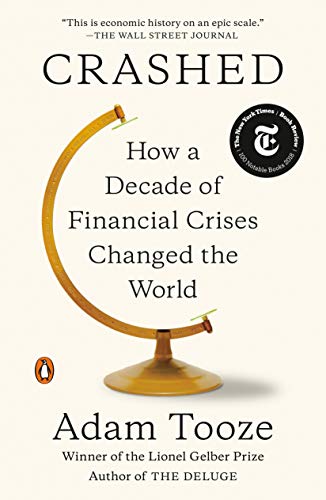Penguin Books
Crashed: How a Decade of Financial Crises Changed the World
Regular price
$20.00 USD
Regular price
Sale price
$20.00 USD
Unit price
per
Couldn't load pickup availability
Title: Crashed: How a Decade of Financial Crises Changed the World
Author: Tooze, Adam
ISBN: 9780143110354
Publisher: Penguin Books
Published: 2019
Binding: Quality
Language: English
Condition: New
New from the publisher
Business & Economics 1210090
Publisher Description:
WINNER OF THE LIONEL GELBER PRIZE
A NEW YORK TIMES NOTABLE BOOK OF 2018
ONE OF THE ECONOMIST'S BOOKS OF THE YEAR
A NEW YORK TIMES CRITICS' TOP BOOK An intelligent explanation of the mechanisms that produced the crisis and the response to it...One of the great strengths of Tooze's book is to demonstrate the deeply intertwined nature of the European and American financial systems.--The New York Times Book Review From the prizewinning economic historian and author of Shutdown and The Deluge, an eye-opening reinterpretation of the 2008 economic crisis (and its ten-year aftermath) as a global event that directly led to the shockwaves being felt around the world today. We live in a world where dramatic shifts in the domestic and global economy command the headlines, from rollbacks in US banking regulations to tariffs that may ignite international trade wars. But current events have deep roots, and the key to navigating today's roiling policies lies in the events that started it all--the 2008 economic crisis and its aftermath. Despite initial attempts to downplay the crisis as a local incident, what happened on Wall Street beginning in 2008 was, in fact, a dramatic caesura of global significance that spiraled around the world, from the financial markets of the UK and Europe to the factories and dockyards of Asia, the Middle East, and Latin America, forcing a rearrangement of global governance. With a historian's eye for detail, connection, and consequence, Adam Tooze brings the story right up to today's negotiations, actions, and threats--a much-needed perspective on a global catastrophe and its long-term consequences.
Author: Tooze, Adam
ISBN: 9780143110354
Publisher: Penguin Books
Published: 2019
Binding: Quality
Language: English
Condition: New
New from the publisher
Business & Economics 1210090
Publisher Description:
WINNER OF THE LIONEL GELBER PRIZE
A NEW YORK TIMES NOTABLE BOOK OF 2018
ONE OF THE ECONOMIST'S BOOKS OF THE YEAR
A NEW YORK TIMES CRITICS' TOP BOOK An intelligent explanation of the mechanisms that produced the crisis and the response to it...One of the great strengths of Tooze's book is to demonstrate the deeply intertwined nature of the European and American financial systems.--The New York Times Book Review From the prizewinning economic historian and author of Shutdown and The Deluge, an eye-opening reinterpretation of the 2008 economic crisis (and its ten-year aftermath) as a global event that directly led to the shockwaves being felt around the world today. We live in a world where dramatic shifts in the domestic and global economy command the headlines, from rollbacks in US banking regulations to tariffs that may ignite international trade wars. But current events have deep roots, and the key to navigating today's roiling policies lies in the events that started it all--the 2008 economic crisis and its aftermath. Despite initial attempts to downplay the crisis as a local incident, what happened on Wall Street beginning in 2008 was, in fact, a dramatic caesura of global significance that spiraled around the world, from the financial markets of the UK and Europe to the factories and dockyards of Asia, the Middle East, and Latin America, forcing a rearrangement of global governance. With a historian's eye for detail, connection, and consequence, Adam Tooze brings the story right up to today's negotiations, actions, and threats--a much-needed perspective on a global catastrophe and its long-term consequences.
Share

